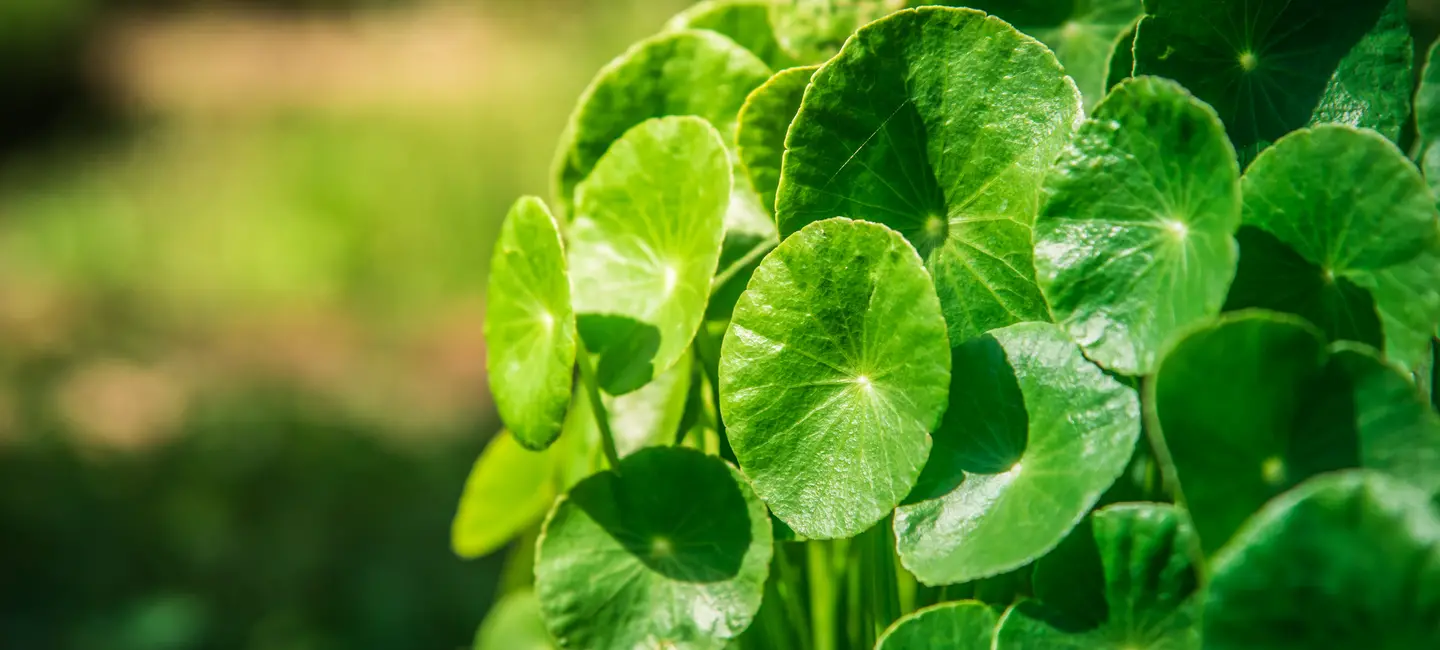
Gotu kola (Centella asiatica) is an herb in the parsley family. It has a long history of use in the traditional Chinese and Ayurvedic medicine systems.
Gotu kola contains certain chemicals that seem to decrease swelling and blood pressure. It also seems to increase collagen production, which might be helpful for wound healing.
People use gotu kola for burns and poor circulation that can lead to varicose veins. It is also used for scars, stretch marks, and many other conditions, but there is no good scientific evidence to support most of these uses.
Is It Effective?
NatMed Pro rates effectiveness based on scientific evidence according to the following scale: Effective, Likely Effective, Possibly Effective, Possibly Ineffective, Likely Ineffective, Ineffective, and Insufficient Evidence to Rate.
- Burns. Applying gotu kola to second-degree burns seems to decrease the time that it takes for burns to heal.
- Poor circulation that can lead to varicose veins and other conditions (venous insufficiency). Taking gotu kola or a specific extract of gotu kola (Centellase) by mouth for 4-8 weeks seems to improve blood circulation and reduce swelling in people with poor blood circulation in the legs.
- Memory and thinking skills (cognitive function). Taking gotu kola alone or with other ingredients by mouth doesn't seem to improve memory or thinking skills.
- Skin damage caused by radiation therapy (radiation dermatitis). Applying a cream containing gotu kola extract doesn't seem to reduce skin damage caused by radiation treatment for breast cancer.
There is interest in using gotu kola for a number of other purposes, but there isn't enough reliable information to say whether it might be helpful.
Is it Safe?
When taken by mouth: Gotu kola extract is possibly safe for most people when taken for up to 12 months. It might cause nausea and stomach pain.
When applied to the skin: Gotu kola is possibly safe when used for up to 10 weeks. It might cause itchiness and redness.
Special Precautions & Warnings:
Pregnancy: Gotu kola is possibly safe when applied to the skin during pregnancy. There isn't enough reliable information to know if gotu kola is safe to take by mouth when pregnant. Stay on the safe side and avoid use.
Breast-feeding: There isn't enough reliable information to know if gotu kola is safe to use when breast-feeding. Stay on the safe side and avoid use.
Liver disease: Gotu kola might cause liver damage. People who already have a liver disease should avoid using gotu kola. It might make liver problems worse.
Surgery: Gotu kola might cause too much sleepiness if combined with medications used during and after surgery. Stop using gotu kola at least 2 weeks before a scheduled surgery.
Medications that can harm the liver (Hepatotoxic drugs)
Interaction Rating=Moderate Be cautious with this combination.
Gotu kola might harm the liver. Some medications can also harm the liver. Taking gotu kola along with a medication that can harm the liver might increase the risk of liver damage.
Sedative medications (CNS depressants)
Interaction Rating=Moderate Be cautious with this combination.
Gotu kola might cause sleepiness and slowed breathing. Some medications, called sedatives, can also cause sleepiness and slowed breathing. Taking gotu kola with sedative medications might cause breathing problems and/or too much sleepiness.
Herbs and supplements that might harm the liver: Gotu kola might harm the liver. Taking it with other supplements that can also harm the liver might increase the risk of liver damage. Examples of supplements with this effect include garcinia, greater celandine, green tea extract, kava, and kratom.
Herbs and supplements with sedative properties: Gotu kola might cause sleepiness and slowed breathing. Taking it along with other supplements with similar effects might cause too much sleepiness and/or slowed breathing in some people. Examples of supplements with this effect include hops, kava, L-tryptophan, melatonin, and valerian.
There are no known interactions with foods.
Gotu kola extract has most often been used by adults in doses of 60-450 mg by mouth daily for 4-12 months. It's also used in creams, gels, and ointments. Speak with a healthcare provider to find out what type of product and dose might be best for a specific condition.
Asiatic Pennywort, Brahma-Buti, Brahma-Manduki, Brahmi, Bua-Bok, Centella, Centella asiatica, Centella Asiática, Centella Asiatique, Centellase, Divya, Hydrocotyle, Hydrocotyle asiatica, Hydrocotyle Asiatique, Hydrocotyle Indien, Indischer Wassernabel, Idrocotyle, Indian Pennywort, Indian Water Navelwort, Ji Xue Cao, Khulakhudi, Luei Gong Gen, Luo De Da, Madecassol, Mandukaparni, Manduk Parani, Mandukig, Marsh Penny, Pegagan, TECA, TTFCA, Talepetrako, Thick-Leaved Pennywort, Tiger Grass, Tsubo-kusa, Tungchian, White Rot.
Information on this website is for informational use only and is not intended to replace professional medical advice, diagnosis, or treatment. While evidence-based, it is not guaranteed to be error-free and is not intended to meet any particular user’s needs or requirements or to cover all possible uses, safety concerns, interactions, outcomes, or adverse effects. Always check with your doctor or other medical professional before making healthcare decisions (including taking any medication) and do not delay or disregard seeking medical advice or treatment based on any information displayed on this website.
© TRC Healthcare 2024. All rights reserved. Use and/or distribution is permitted only pursuant to a valid license or other permission from TRC Healthcare.
